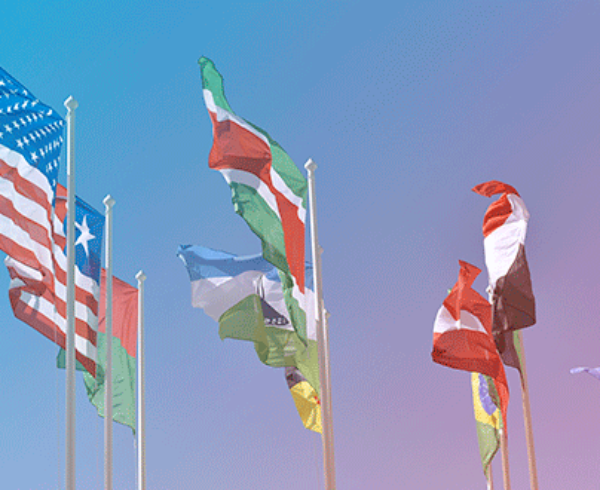If your employees regularly hit the road for work, you likely have questions about the COVID vaccine and travel. This post includes the answers that are currently available.
If you run a company that asks employees to attend conferences or make remote presentations and sales pitches, the COVID vaccine and travel are likely intertwined in your mind. The spread of COVID-19 has made travel more difficult, limiting companies’ collective ability to develop new business and meet with far-flung clients. The COVID-19 vaccine could be a magic wand that removes these limitations.
That said, there’s still a lot of uncertainty about the COVID-19 vaccine. When will it be widely available? Will airlines require passengers to get one? Can employers mandate that employees get vaccinated?
See below for the latest information on the COVID vaccine and travel — including what’s relevant now and in the coming months.

The CDC’s Vaccine Rollout Recommendations
The Centers for Disease Control and Prevention (CDC) have made recommendations on who should get the COVID-19 vaccination first as supplies are somewhat limited. We remain in the first phase of the vaccine rollout, with the following groups getting priority:
- 1A: Healthcare personnel and residents at long-term care communities.
- 1B: Frontline essential workers and anyone 75 years old or more.
- 1C: Anyone between 65 and 74 years old, anyone 16 to 64 with an underlying medical condition, and other essential workers.
Very few of the people included in the first phase of vaccination will be employed by private companies. Different states may have different rules and priorities for vaccinations — they don’t have to follow the CDC’s guidelines. But even the second phase of vaccination will include few employees of private businesses.
There remain significant unknowns around the vaccination timeline. And, until there’s more certainty around when healthy, everyday Americans will be able to get the vaccine, vaccinations will not play a huge role in anyone’s ability to travel.
Vaccinations in the Travel Industry
Many airlines and other companies in the travel industry are pushing for their workers to get vaccinated. In many cases, these companies are finding success. For example, Etihad Airways reports that 100% of its onboard flight staff have received the COVID-19 vaccination.
Travel industry employees are not specifically called out in the CDC’s first-phase recommendations, so it may be difficult for US-based travel companies to similarly vaccinate their employees. But, as the vaccination rate climbs in the United States and other first-world countries, the infection rate will begin to fall. To some extent, as airlines, airports and hotels continue enforcing mask mandates and social distancing, travel will become safer in the coming months as there are fewer infections in society at large.
Until vaccinations become more widely available, COVID-19 testing will continue serving as the most common requirement and constraint to travel.

Current COVID-19-Related Travel Requirements
Many countries have in place negative test and quarantine requirements for travelers. Some states are even asking domestic travelers to provide a negative test or to self-quarantine for a certain period of time before moving about. Some airlines are helping passengers prepare to meet their destinations’ travel requirements, including United and its Travel-Ready Center.
But, as COVID-19 vaccinations become more widely available, expect to see fewer and fewer negative-test and self-quarantine requirements. Instead, countries and even states may require a COVID-19 vaccination before welcoming guests from other countries and states.
So, if you regularly send your employees out of state or out of country for work, those employees will likely need a COVID-19 vaccination to travel freely in the future.

An Executive’s Duty of Care Responsibility With the COVID-19 Vaccine
All executive leaders have a duty of care responsibility to keep their travelers safe from harm while away from the office on assignment. New guidance from the Employment Opportunity Commission suggests that companies can require workers to get the vaccine, as long as there are disability and religious objections allowed. But the real question is: Can executives ask non-vaccinated employees to travel?
Only decision-makers at companies can answer that question. In the short-term, as the vaccination rate ramps up, it’s likely best to stick with your pre-vaccine travel policy. If you weren’t traveling at all before the vaccine, you shouldn’t ask non-vaccinated team members to travel now. If you were leaving it up to team members before the vaccine, making it their choice whether or not to travel, you should continue doing so.
Long-term, as a significant portion of the population receives the vaccination, the rate of infection will drop dramatically. At that time, it will become much safer for someone without the vaccine (perhaps due to a disability or religious objection) to travel. To be on the safe side, it would be best to encourage non-vaccinated travelers to continue wearing masks, using hand sanitizer and social distancing. But, in a future where the vaccine is widespread, chances of infection will plummet.
When in doubt, come back to the duty of care responsibility you have to your workers. What do you need to do to ensure they stay as safe as possible while traveling away from the office? The answer to that question should guide your vaccine-related decisions.
JTB: Your Comprehensive Business Travel Solution
At JTB Business Travel, we offer a comprehensive suite of services to clients who need a quality, reliable travel management company — duty of care services included. If you have questions or needs related to COVID-19 or your ongoing travel program, we can help. Behind every recommendation we make and every service we provide is a common-sense approach to business travel.
Contact us to learn more about how we can help you overcome business travel challenges.














Leave a Comment